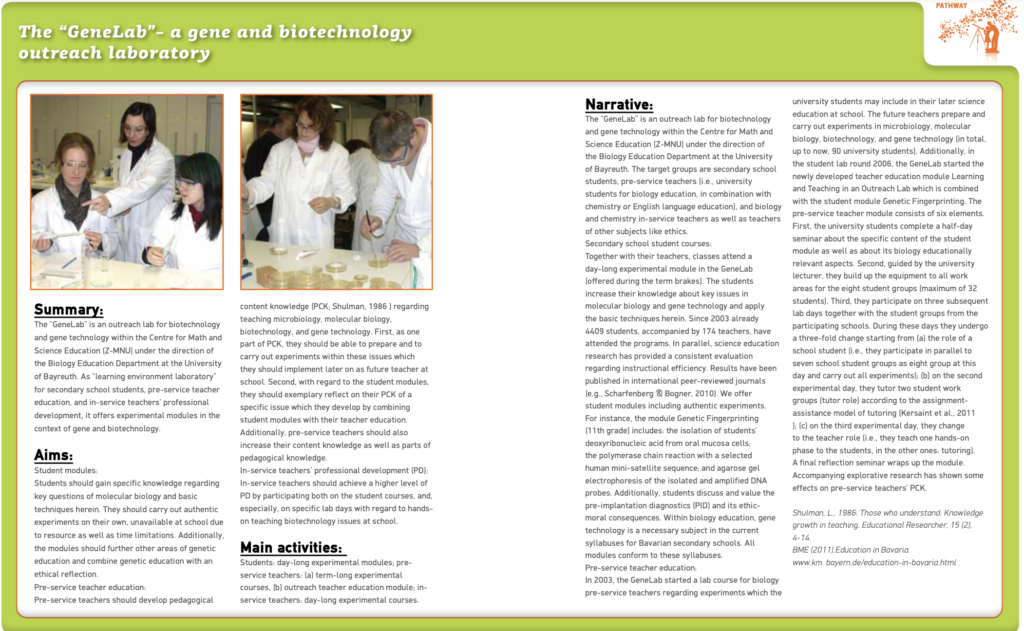Strategies – The “Teacher-Led Outreach-Laboratories” (TLOL) Strategy
This strategy has been investigated with biology teachers in the outreach laboratories, which are offered to science teachers and students at the University of Bayreuth (https://www.bayceer.uni-bayreuth.de/didaktik-bio/?lang=de). In contrast to most outreach laboratories, in which the academic personnel teach visiting classes, the program offers a unique setting in which the high-school biology teachers themselves teach their own students at university laboratories, following appropriate professional training. The TLOL project offers biology teachers one-day-long teaching units of contemporary molecular genetics experiments that conform with the current syllabus of 12th-grade biology and biotechnology majors and a continuous process for professional development. Participation in the TLOL project starts with a workshop in which the school heads and the teachers can experience the activities hands-on and learn the molecular biology methods as learners similarly to their students (following the “Teacher as learner” paradigm). Following the initial workshop, the school heads and teachers can participate in other workshops as many times as they wish, they are invited to observe other teachers, and they can ask questions and exchange pedagogical materials with other teachers and with the researchers via an electronic forum on the internet. Thus, providing the teachers with sufficient time, structure and support to think through the experience, allowing them to observe and be observed, to engage with their “community of practice” and develop sustained and ongoing communication with the PD facilitators as well as with other teachers. By incorporating the tools and using the knowledge the teachers have acquired during and following the workshop, the teachers design and plan their own laboratory activity, and prepare worksheets, assignments and presentations that suit the knowledge level of their students. They prepare their students before the activity and eventually, put what they have learned into practice by teaching the laboratory activity to their own students in the university laboratories. An individual school head or teacher can come several times with different classes to the Institute’s laboratories and teach the activities to suit each class’s level. The teachers analyse the final results of the experiments and conduct discussions with their students once they are back in their classrooms. Subsequently, the teachers can include questions regarding the TLOL activity in exams. Some teachers ask their students to submit laboratory reports for each experiment performed. During instruction in molecular genetics, the teachers make connections between the learning materials taught in class and the activity. Moreover, since the TLOL setting provides a hands-on inquiry experience, it is often the only opportunity for high-school biology teachers, especially those who finished their studies many years ago, to practice inquiry in molecular biology. Therefore, the contribution of the TLOL platform is way beyond the specific laboratory activity and is influential in their entire teaching of contemporary biology.
1 Comment
Submit a Comment
You must be logged in to post a comment.



This TLOL program represents a significant advancement in the training of biology teachers, as it offers them not only updated technical knowledge but also hands-on, direct laboratory experience. In my opinion, this approach is essential because it strengthens the teacher’s role as a facilitator of active knowledge, who continuously learns to teach more effectively and inspiringly.
The involvement of teachers in practical activities that they then replicate with their students creates a virtuous cycle of learning and teaching that values both theory and practice. Moreover, the fact that teachers can share experiences and materials in a collaborative community is a great boost for pedagogical innovation and professional growth.
I see this methodology as an excellent way to motivate teachers to embrace current science, reducing the gap that can exist between formal content and real laboratory practices. It is a clear example of how education can evolve when we put teachers at the center of the learning process, equipping them with tools and opportunities to develop themselves and, thus, improve teaching and student interest in science.